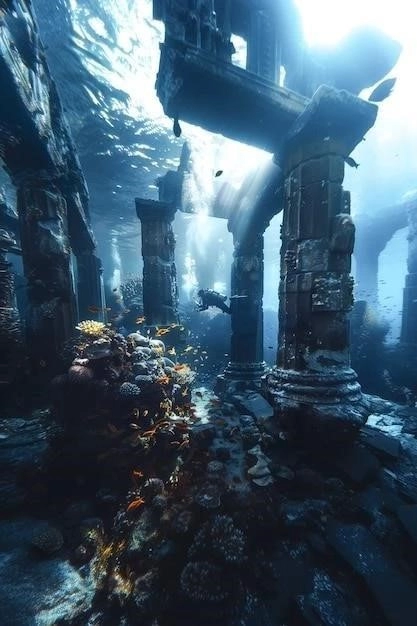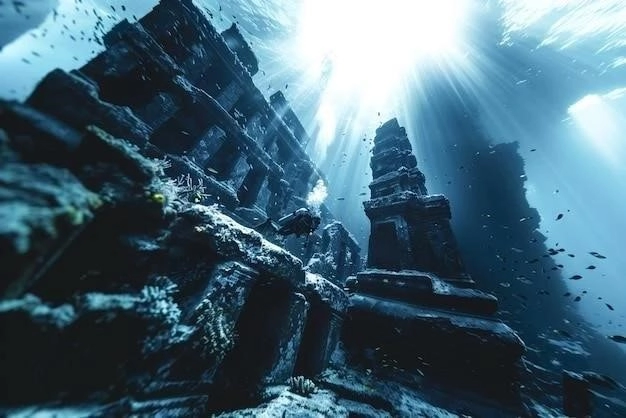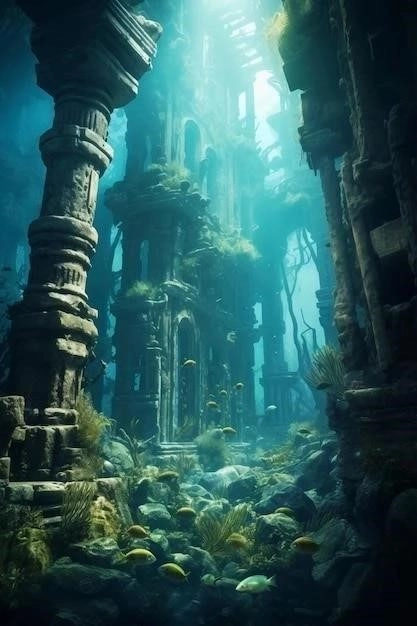
Introduction
The story of Atlantis, a technologically advanced civilization swallowed by the sea, has captivated imaginations for millennia. Since Plato first described it in his dialogues, Timaeus and Critias, around 360 B.C.E.٫ the legend of Atlantis has sparked countless expeditions٫ books٫ documentaries٫ and theories. However٫ despite its enduring popularity and the allure of discovering a lost utopia٫ the existence of Atlantis remains firmly in the realm of myth٫ unsupported by scientific or archaeological evidence.

Plato’s Atlantis: An Allegory, Not History
To understand the enduring mystery of Atlantis, it’s crucial to examine its origins. Plato, a Greek philosopher, introduced Atlantis in his dialogues not as a historical account but as a philosophical allegory. He used the story to illustrate the dangers of unchecked ambition and the consequences of a society prioritizing material wealth and military might over wisdom and virtue. Plato’s Atlantis, depicted as an antagonist to his idealized Athens, served as a cautionary tale rather than a historical record.
The Search for Evidence: A History of Dead Ends
Despite the lack of concrete evidence, the allure of Atlantis has fueled centuries of speculation and exploration. From the Mediterranean Sea to the Atlantic Ocean, researchers have scoured the globe, interpreting geological formations, ancient ruins, and even underwater anomalies as potential signs of the lost city. However, none of these discoveries have provided conclusive proof of Atlantiss existence.
Here are some prominent examples:
- Santorini Eruption: Some scholars have linked the destruction of Atlantis to the volcanic eruption on the island of Santorini, which devastated the Minoan civilization around 1600 B.C.E. However, the timeline and geographical details don’t align with Plato’s account.
- Richat Structure: This circular geological formation in Mauritania, known as the “Eye of the Sahara,” has been proposed as a possible location for Atlantis. However, geological studies have debunked this theory, identifying it as a natural formation.
- Bimini Road: This underwater rock formation near the Bahamas was touted as evidence of Atlantis in the 1960s. However, geological analysis revealed it to be a naturally occurring limestone pavement.
The Persistence of the Myth: Why We Want to Believe
The enduring fascination with Atlantis highlights the human desire to believe in lost civilizations and hidden knowledge. The idea of a technologically advanced society disappearing beneath the waves speaks to our sense of wonder and the mysteries that still surround our planets history. Furthermore, the concept of Atlantis as a utopia, a society free from the problems and complexities of our own, holds a powerful allure.
Conclusion: Embracing the Wonder While Acknowledging Reality
While the existence of Atlantis as a real historical place remains highly improbable, its impact on our collective imagination is undeniable. The story continues to inspire art, literature, and exploration, reminding us of the power of storytelling and the enduring human fascination with the unknown. While we may never uncover the ruins of Atlantis, the legend serves as a reminder to approach history with a critical eye, to distinguish between fact and fiction, and to appreciate the enduring power of myth and imagination.
Further Considerations:
While the evidence suggests that Atlantis is a myth, the pursuit of understanding its origins and enduring appeal opens up fascinating avenues for research and exploration. Here are some questions to consider:
- What cultural and societal factors contributed to the widespread belief in Atlantis, even in the face of lacking evidence?
- How has the legend of Atlantis been used and reinterpreted in different historical periods and cultural contexts?
- What does the enduring fascination with Atlantis tell us about the human desire for utopia and the search for meaning in history?
By examining these questions, we can gain a deeper appreciation for the complex interplay between myth, history, and the human imagination.
Beyond Atlantis: Examining the Appeal of Lost Civilizations
While the weight of evidence suggests that Atlantis is a product of philosophical storytelling rather than historical reality, the enduring fascination with the lost city prompts further inquiry. Why do such narratives, devoid of tangible proof, hold such sway over human imagination? And what can this enduring fascination reveal about our relationship with history, myth, and the unexplored corners of our planet?
Several factors contribute to the persistent allure of lost civilizations like Atlantis:
1. The Allure of the Unknown:
Humans possess an innate curiosity for the unexplored, a drive to unravel mysteries and uncover hidden truths. Legends like Atlantis tap into this fundamental desire, presenting a tantalizing glimpse into a world lost to time. The very act of searching for these lost worlds, regardless of their veracity, fuels our sense of wonder and allows us to engage with history in a more imaginative and emotionally resonant way.
2. Yearning for a Golden Age:
Many narratives of lost civilizations, including Atlantis, depict them as utopian societies, technologically advanced and morally superior to our own. This portrayal resonates with a common human yearning for a simpler, more harmonious past, a “golden age” free from the complexities and conflicts of modern life. The allure of Atlantis, then, lies partly in its promise of a lost paradise, a societal model that we might aspire to rediscover or recreate.
3. The Power of Storytelling:
Platos account of Atlantis, regardless of its intended purpose, possesses a timeless narrative power. It weaves together elements of adventure, tragedy, and the clash between hubris and wisdom, creating a story that transcends cultural and temporal boundaries. The enduring appeal of Atlantis speaks to the power of storytelling itself, its ability to capture our imaginations and shape our understanding of the world, even in the absence of concrete evidence.
Conclusion:
While the search for tangible proof of Atlantis may prove forever elusive, the legends enduring impact underscores the profound influence of myth and imagination on human understanding. By examining the reasons behind our fascination with lost civilizations, we can gain a deeper appreciation for the complex interplay between history, narrative, and the human desire to explore the unknown, both physically and within the realms of our own imagination.

The Enduring Influence of the Atlantis Myth: From Academic Discourse to Popular Culture
The enduring fascination with Atlantis extends far beyond the realm of academic debate and archaeological investigation. The legend has permeated popular culture, inspiring countless works of literature, film, television, and even video games. This widespread adaptation speaks to the myths capacity to transcend disciplinary boundaries, capturing the imaginations of audiences across generations and backgrounds.
Atlantis in the Public Imagination:
- Literary Explorations: From H.P. Lovecrafts chilling depiction of a submerged city in “The Call of Cthulhu” to J.R.R. Tolkiens Númenor, a powerful island kingdom that ultimately succumbs to hubris, echoes of Atlantis reverberate throughout 20th and 21st-century literature. These works often use the lost city as a metaphor to explore themes of technological advancement, societal corruption, and the cyclical nature of history.
- Cinematic Representations: The silver screen has witnessed numerous interpretations of the Atlantis myth, ranging from Disneys animated adventure “Atlantis: The Lost Empire” to the science fiction action of “Aquaman.” These films capitalize on the visual spectacle of a submerged civilization, often depicting it as a technologically advanced society harboring ancient secrets or serving as a backdrop for thrilling escapades.
- Video Game Adventures: The interactive realm of video games has also drawn inspiration from Atlantis, offering players the chance to explore virtual recreations of the lost city, solve puzzles tied to its mysteries, or even engage in combat within its submerged ruins. These games, while often departing from the original narrative, demonstrate the enduring allure of Atlantis as a setting ripe with adventure and intrigue.
Analyzing the Myths Cultural Impact:
The prevalence of Atlantis in popular culture speaks to its ability to tap into deep-seated human desires and anxieties; The myth offers a compelling blend of adventure, mystery, and cautionary tale, inviting audiences to ponder the possibilities of lost knowledge, the consequences of unchecked ambition, and the enduring power of human curiosity.
Moving Beyond the Search: Reframing Atlantis for the Future
While the search for physical evidence of Atlantis may continue to captivate some, perhaps a more fruitful approach lies in exploring the myths enduring cultural significance. By examining its various interpretations and adaptations, we can gain a deeper understanding of the human relationship with history, the allure of the unknown, and the enduring power of storytelling to shape our understanding of the world.
Instead of seeking to prove or disprove its existence, we can choose to engage with Atlantis as a mirror reflecting our own hopes, fears, and aspirations. In doing so, we may discover that the true value of the myth lies not in its historical veracity, but in its capacity to inspire our imaginations, challenge our assumptions, and invite us to explore the boundless possibilities of both our past and our future.
Beyond the Depths: Atlantis as a Reflection of Ourselves
While the physical reality of Atlantis remains firmly in the realm of speculation, its enduring presence in human consciousness invites us to consider its symbolic weight. Perhaps Atlantis, more than a lost city, serves as a potent mirror reflecting our own complexities, aspirations, and anxieties.
1. Atlantis as Cautionary Tale: The Perils of Hubris and the Fragility of Progress
Platos original telling of Atlantis frames its demise as a consequence of hubris. The Atlanteans, consumed by their own power and ambition, stray from wisdom and virtue, ultimately triggering their own downfall. This narrative resonates with a recurring theme in human history – the potential for progress to be undermined by greed, unchecked ambition, and a disconnect from ethical considerations.
Examining Atlantis through this lens offers valuable insights into contemporary concerns. As we grapple with the ramifications of rapid technological advancements, climate change, and socio-political upheaval, the story of Atlantis serves as a potent reminder of the fragility of progress and the importance of aligning innovation with ethical responsibility.
2. Atlantis as Utopian Ideal: Projecting Desires and Shaping Visions of the Future
The enduring image of Atlantis as a technologically advanced, culturally sophisticated, and perhaps even spiritually enlightened society speaks to a deep-seated human longing for utopia. This idealized vision often reflects contemporary anxieties and aspirations. Just as Atlantis was often imagined as technologically superior in Platos time, modern interpretations often reflect current anxieties about artificial intelligence, bioengineering, and the potential consequences of unchecked scientific advancement.
However, engaging with these utopian visions, even if born from myth, can be a productive exercise. By envisioning idealized societies, we engage in critical thought experiments about social structures, governance, and the pursuit of collective well-being. While a real-world Atlantis may forever remain elusive, the act of imagining it can inspire practical efforts towards creating a more just and equitable future.
3. Atlantis as a Catalyst for Exploration: Inspiring Curiosity and Expanding Our Understanding of the World
Finally, the enduring mystery of Atlantis, regardless of its factual basis, has undoubtedly served as a catalyst for exploration and discovery. The pursuit of this elusive civilization has fueled advancements in oceanography, archaeology, and our understanding of ancient cultures.
Furthermore, the very act of seeking Atlantis, even if ultimately fruitless, speaks to a fundamental human drive: the need to explore, to push boundaries, and to challenge the limits of our knowledge. This spirit of inquiry, whether directed toward uncovering the secrets of the deep sea, unraveling the mysteries of space, or probing the depths of human consciousness, remains essential to our continued growth and understanding of the world and our place within it.
Conclusion: The Legacy of Atlantis ― Beyond Myth, a Mirror to Humanity
While the question of Atlantiss physical existence may remain unanswered, its enduring legacy lies in its ability to spark our imaginations, challenge our assumptions, and inspire deeper reflection on the human condition. By embracing the multifaceted interpretations of Atlantis, we can move beyond the confines of factual validation and instead utilize the myth as a potent tool for self-examination, ethical contemplation, and the continued pursuit of knowledge and understanding. The true mystery of Atlantis, then, lies not in its location on a map, but in its enduring capacity to illuminate the depths of human consciousness and inspire us to imagine and strive for a better future.










